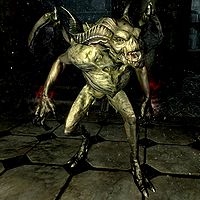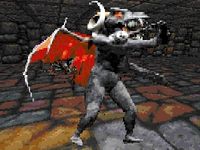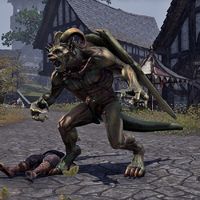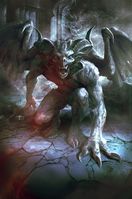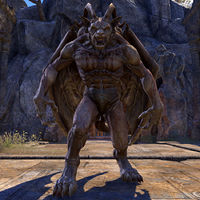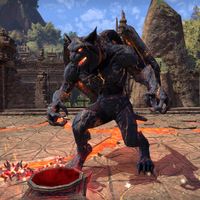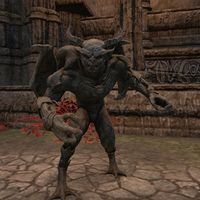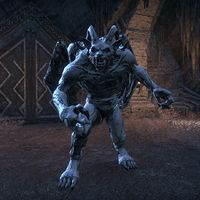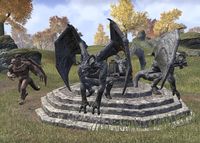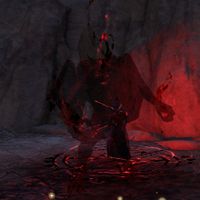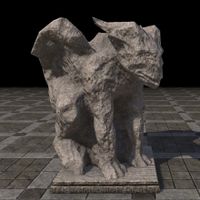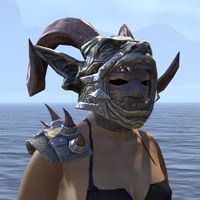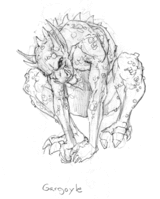Lore:Gargoyle
Gargoyles are living statue creatures that have been created or animated by a wizard or vampire.[1][2] They are a type of advanced stone golem,[3][UOL 1] and are often found guarding dungeons, castles, and ancient ruins. They can form a hard rocky skin when stationary.[4] Some will remain frozen for long periods of time to make their prey think they are an ordinary statue, before finally bursting out of their stone skin and ambushing their victim. Since they are made of stone, they are resistant to damage to some extent. They have been known to utilize basic magic to absorb the health of those stuck by their claws.[5] Gargoyles sometimes wield melee weapons in combat.[6]
Gargoyles have been utilized by many different civilizations on Tamriel, including Bretons, Direnni, Yokudans, Imperials, Ayleids, and Khajiit.[7] They most commonly resemble misshapen humanoid beasts, with gray-green skin, gnarled tusked faces, horns, pointed ears, and batlike wings.[8] Khajiiti gargoyles instead possess feline features.[7] Gargoyles are most commonly found in the company of vampires, and some vampire lords possess the ability to use blood magic to summon gargoyles to fight for them.[9][10] Gargoyles created by vampires sometimes appear more batlike than their usual counterparts.[11]
Despite being magically created beings, gargoyles are known to have fleshlike hides.[7] Gargoyles have been known to pay amorous attention to non-living statues that have been carved to resemble a fellow gargoyle.[12] Indeed, they can often be found near non-living statues which are similar in appearance to themselves, providing a greater aid to their camouflage.[5] Some gargoyles possess an outer skin of frozen ice rather than stone.[13] Sangiin is known to be associated with spectral gargoyles created by blood magic.[14]
The tongue of a gargoyle is required to create a stoneflesh antidote, a potion that can cure a person who was turned to stone. The ancient Yokudans were believed to have been inspired by gargoyles and experimented on their own flesh with such curses.[15]
Gargoyles have been likened to the giant goblins first encountered by the Yokudans when they conquered Hammerfell,[8] although they are actually completely unrelated.[16]
Gallery[edit]
Notes[edit]
- While gargoyles are commonly treated as literal living statues,[2][3][UOL 2] some sources may imply there are both natural gargoyles and artifical gargoyles,[12][4] and have even described them as a race.[12]
See Also[edit]
- For game-specific information, see the Daggerfall, Skyrim, ESO, Legends, and Castles articles.
References[edit]
- ^ Serana's dialogue in Skyrim
- ^ a b Dialogue in Hunt for a Gargoyle quest in Daggerfall
- ^ a b Norianwe's dialogue in ESO
- ^ a b Skyrim loading screen
- ^ a b Gargoyles in Skyrim
- ^ Gargoyle in Daggerfall
- ^ a b c Gargoyles in ESO
- ^ a b The Mystery of Gargoyles—Solved! — Porbert Lyttumly
- ^ Summon Gargoyle in Skyrim
- ^ Legends card in Legends
- ^ Gargoyles in Greymoor Keep in ESO
- ^ a b c Statuary Complications
- ^ Doylemish Ironheart in ESO
- ^ Sangiin's Thirst in ESO
- ^ Tongues of Stone quest in ESO
- ^ Flint-Tooth Tribe in ESO
Note: The following references are considered to be unofficial sources. They are included to round off this article and may not be authoritative or conclusive.
- ^ Six Views of the Egg of Time, V. III — Geor Elbert, Doctor of Melancholy and Mania, Wayrest Royal Asylum
- ^ Six Views of the Egg of Time, V. III — Geor Elbert, Doctor of Melancholy and Mania, Wayrest Royal Asylum
